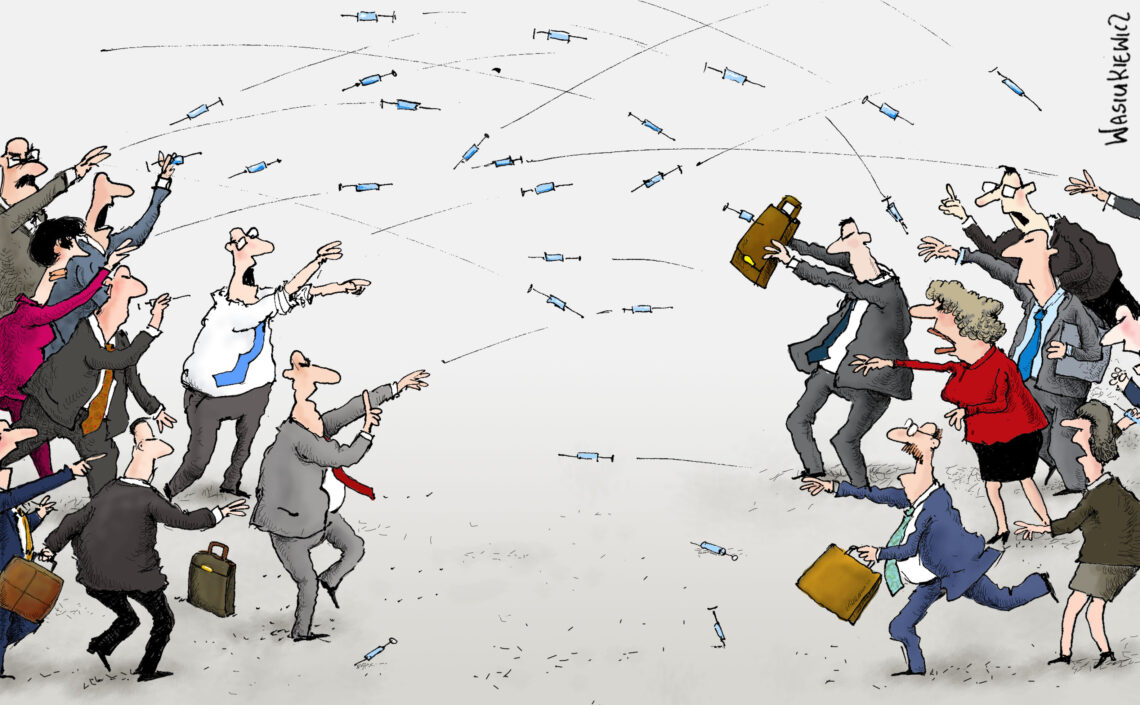Europe’s tragic vaccine saga
The slow start to Europe’s vaccination program has set off a round of unhelpful political finger-pointing. A level-headed analysis shows the EU should prioritize testing and vaccine procurement, while empowering businesses to develop remedies.

Hungary and the United Kingdom aside, Europe’s Covid-19 vaccination program has not gotten off to an impressive start. Compared with countries like the United States or Israel, the European Union is behind. The rollout is progressing agonizingly slowly due to logistical issues and insufficient supply.
The political blame game has begun. In Germany, the states and the opposition are criticizing the federal government. Chancellor Angela Merkel has been put on the defensive and has tried to shift the public’s focus to other subjects. Olaf Scholz, who leads the junior coalition partner, the Social Democratic Party, has criticized elements on both the left and right of the political spectrum but has also singled out Brussels.
Pointing fingers
The European Commission has taken much of the blame. It says the supply squeeze is due to the suppliers not honoring their contracts. Commission President Ursula von der Leyen has vocally accused the suppliers of wrongdoing. Like Chancellor Merkel, whose government held the rotating European presidency when the contracts were negotiated, Ms. von der Leyen has also tried to distract attention from the slow pace of distribution by frequently discussing the threats that the pandemic presents.
It is not just Germany and the Commission. Throughout Europe, politicians, pundits and the media are pointing fingers – and none of it is helpful. Instead, a coolheaded analysis is in order.
Putting health policy in local leaders’ hands makes sense.
We know that the situation was already very difficult in early 2020, but there has been plenty of time to act. In the U.S., the Trump administration recognized that health policy was mainly the individual states’ responsibility, not the federal government’s. Though President Trump was criticized for playing down the disease’s danger, he initiated a program called Operation Warp Speed, whose purpose was to develop a viable vaccine as quickly as possible. Washington seems to understand that the challenge now is vaccine procurement.
Israel, for its part, took a two-pronged approach. While instituting lockdowns, it made obtaining vaccines a top government priority.
Costly mistakes
In Europe, events took a tragic turn. Governments flexed their muscles by restricting businesses and their citizens’ freedom of movement. The cost of these measures is enormous and is being used as a pretext to further increase the size and role of government. The result is more debt and a huge financial burden on future generations.
One crucial measure that could have helped delay the spread of the disease, testing, started slowly. European officials decided that the pandemic was a supranational problem, even though EU rules give the individual members responsibility for health policy. Germany even delegates that authority to its states.
Putting health policy in local leaders’ hands makes sense. Pandemics affect various regions differently. The system works well, since hospitals can specialize and then work together on a region-wide level.
It is a credit to companies that the vaccines were developed in record time.
Having declared the pandemic a European problem, responsibility for procuring medicine and equipment fell in Brussels’ lap, thereby creating Europe’s vaccination program. All we can blame the Commission for is accepting this responsibility since, unfortunately, the Union was not yet sufficiently experienced in procurement. In doing so, it had good intentions, but ignoring the advantages of local responsibility has further fueled euroskepticism and suspicions that the EU is trying to siphon power away from national governments.
The blame game needs to end. Instead, Europe should focus its energy on conducting efficient, widespread testing (potentially based on the successful drive in the canton of Grisons, Switzerland) and vaccination. It should also find ways to encourage businesses to develop more vaccines and other remedies.
Admonishing companies for the delays is disgraceful. It is a credit to them that the vaccines were developed and manufactured in record time. It was a tremendous success for business and the market economy.
Whatever blame there is should go to the politicians and the media that stoked the panic and concentrated on lockdowns as the only way to slow the spread of the virus. They should have promoted more avenues for citizens to engage in the fight against the virus. That effort should be based on personal responsibility rather than relying on constraints. The opportunity to communicate the advantages of a healthy lifestyle to improve prevention was missed.
